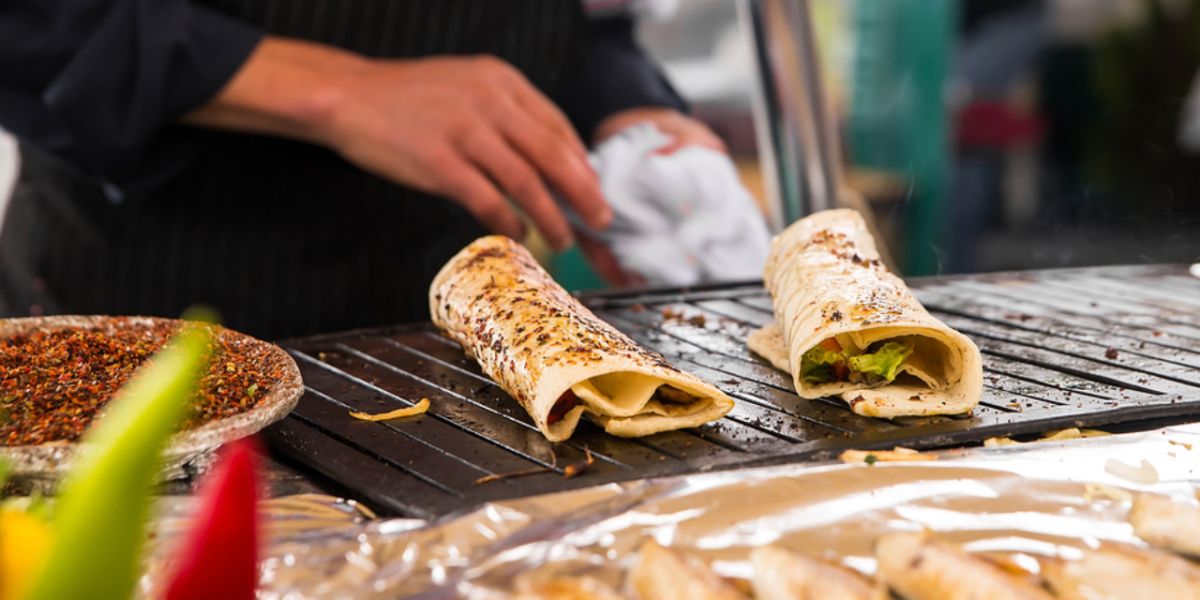
Just like Türkiye and its society, Turkish cuisine bears the influence of a variety of neighboring regions — North Africa, the Middle East, and Eastern European countries — and can be viewed as a bridge between Eastern and Mediterranean cuisines.
Making abundant use of fresh vegetables and of local herbs and spices along with tasty meat, Turkish cuisine is as healthy as it is delicious.
Culinary culture in Türkiye
As in many Mediterranean countries, food is of utmost importance in Türkiye and forms a key part of everyday life. In fact, most socialization events revolve around food sharing.
Your Turkish hosts will consistently insist on feeding you homemade dishes. Therefore, demonstrating reluctance can be perceived as indelicate.
Good to know:
It is customary to give some of your homemade food to your neighbors on special occasions and holidays, who will, of course, return the favor. Most Turkish households are equipped with a device formed of a hanging basket with a pulley system that can be sent to other floors of the building to exchange objects with neighbors without constantly having to go up and down the stairs. However, with the spread of the new high-rise apartment complex sites around big cities like Istanbul, Bursa, Izmir, and Ankara, this tradition started to disappear.
While the staple of continental Anatolian cuisine is grain, vegetable and meat, the Western coastal areas, more influenced by Greek gastronomy, offer many fish or seafood specialties. You can find some of the best virgin olive oil ever produced on the western and southern coasts of Türkiye.
Signature Turkish dishes
The mention of Turkish food immediately evokes the kebab (in Turkish, kebap), a seasoned, grilled piece of meat - generally lamb - served on skewers alongside bulgur or inside a pita bread.
Among the other signature dishes are the dolma, made of tomatoes or peppers filled with a mixture of seasoned rice and minced meat, the yaprak sarma, a rice-based mixture wrapped inside a vine leaf, and the kofte, consisting of grilled meat-based pads.
Many traditional Turkish dishes involve meat, but vegetable-based options – stews, soups, casseroles – exist for vegetarian or vegan expats. Take note that Türkiye is very rich when it comes to the variety of fruits available in the country.
When it comes to desserts, besides the well-known baklava and lokum (Turkish Delight), Turkish cuisine offers many interesting options, for example, the kunefe, a cheese-based pastry, or the tavuk göğsü, a sweet cream made with milk, sugar, and chicken breast.
Good to know:
Turks have the custom of eating anything and everything with yogurt. While this practice is surprising to many expats at first, most eventually come around and follow suit. As goes a common joke among expats, “you know you've spent some time in Türkiye when you spontaneously ask for yogurt.”
Turkish breakfast
Turkish breakfast, or "kahvaltı," is an experience you shouldn't miss. It's a feast for the senses, characterized by an array of flavors and textures. This traditional meal often includes freshly baked bread, a variety of cheeses, olives, tomatoes, cucumbers, jams, honey, and the rich, creamy Turkish yogurt. It's common to find different types of eggs, such as "menemen," and cured meats like "sucuk" or "pastırma" as part of this lavish spread. One of the unique experiences is the "köy kahvaltısı" or "village breakfast," which offers a more rustic and authentic take on the Turkish breakfast, often featuring local and organic produce. This communal and leisurely meal is not just about food; it's a cultural ritual that brings people together, making it a must-try for expats to truly immerse in the Turkish way of life.
Useful links:
Turkish chef, Refika Birgul's website
Signature Turkish drinks
The ultimate Turkish beverage is undeniably the freshly brewed black tea, which is consumed at all times of the day and in every possible setting. You will be offered tea in the doctor's waiting room, in administration services, and even when stuck in traffic, as street vendors move from car to car to offer drivers a cup.
Turkish coffee, an unfiltered coffee made of a strong roasted and ground blend, is almost equally popular. It can be consumed either with sugar or sade (plain).
Ayran, a creamy mixture of yogurt, water and salt, is deliciously refreshing and is said to have anti-aging properties. It is a must to try this drink with kebab or döner (Turkish gyro meat).
For mature drinkers, raki, a potent anise-based liquor similar to the Greek ouzo or the French pastis but with less anise flavor, is the national alcoholic beverage. It is usually consumed in traditional restaurants called meyhane, along with meze (appetizers) while listening to traditional Ottoman music. Seafood is the most prominent choice when it comes to enjoying raki.
Good to know:
Consumption of raki is amply codified and subject to dozens of sophisticated rules. Although you are not expected to know all the subtleties, the one important rule is to drink slowly. The point is to share a precious moment with loved ones, and there is no such thing as binge drinking with raki.
We do our best to provide accurate and up to date information. However, if you have noticed any inaccuracies in this article, please let us know in the comments section below.








